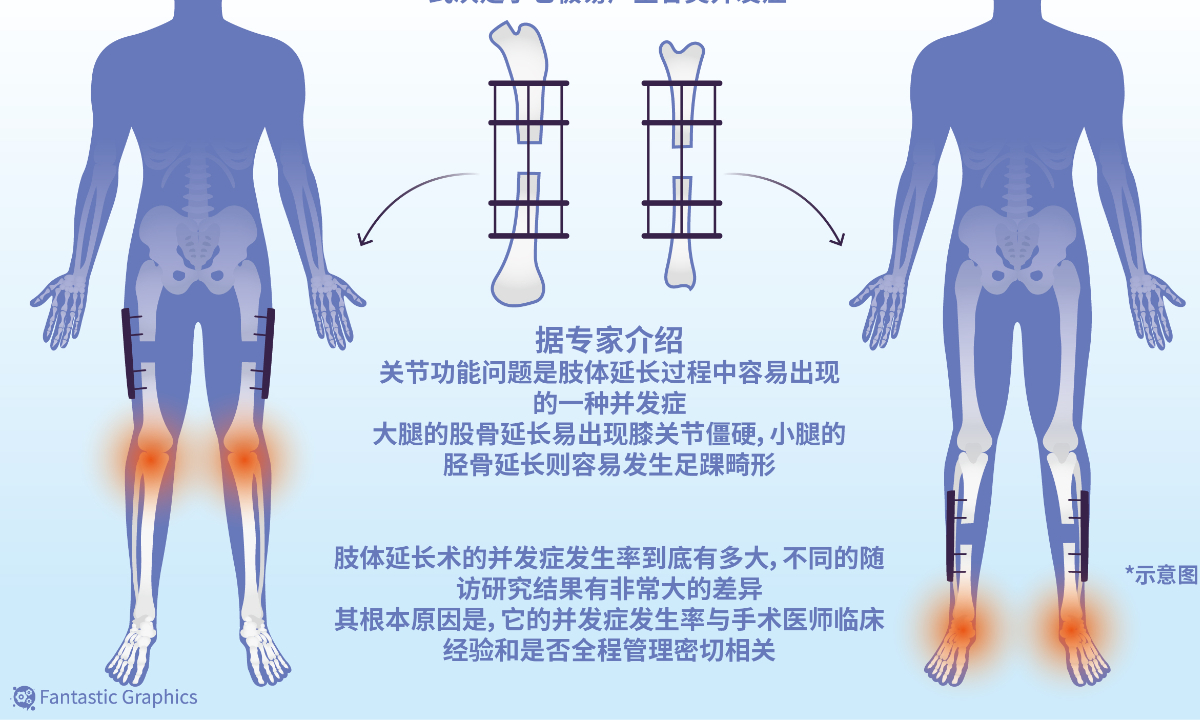
Limb lengthening surgery has high risks. Photo: VCG
An investigation by CCTV on Sunday revealed the hidden profit chain of the limb lengthening surgery industry,
MK socks shedding light on the suffering of individuals who were enticed to undergo surgery abroad, only to face severe complications.
Limb lengthening surgery, commonly known as "breaking bones to boost height" in China, is intended to address congenital deformities, shortened limbs due to acquired causes, bone defects and other diseases, and to help patients realize the equal length of both lower limbs, reported CCTV.
This kind of surgery has been explicitly banned for cosmetic use in China due to its high risks. Some seek to bypass the obstacle by undergoing surgery abroad. However, they could face terrible consequences if the surgery fails. The Global Times recently talked to one such victim.
In 2020, Fang, from East China's Jiangsu Province, came across advertisements on several Chinese social media platforms promising the safety of limb lengthening surgery, which allegedly allowed patients to resume normal physical activity after surgery, including even intense contact sports. Dissatisfied with her height, which stands at 1.50 meters, Fang contacted one of the intermediary agencies and joined a group of more than a dozen people with the same goal to undergo the procedure in Turkey.
In May 2021, Fang underwent several surgeries and her tibia was lengthened by about 6 centimeters.
However, by July 2021, she developed a serious infection in her right leg, according to CCTV report.
"The internal pins in my leg were of mismatched models and had weight-bearing issues, which directly led to bone nonunion and chronic osteomyelitis. I was later diagnosed with valgus deformity of the right knee, and clubfoot," Fang told Global Times.
The intermediary agency informed her that the doctor had terminated their contract, and the replacement doctor would be unavailable temporarily. Fang repeatedly tried to contact the relevant doctors for urgent treatment, but she faced multiple excuses.
"The agency refused to help me with debridement or remove the pins, citing concerns that any new treatment would be unfair to other patients. They also said my condition wasn't severe enough to require immediate debridement and even denied internationally recognized treatments for osteomyelitis," she said. With no other option, she had to return to China for treatment.
Fang said that the intermediary agency lured numerous Chinese patients with deceptive advertising on social media platforms and arranged for them to travel to Turkey for high-risk limb lengthening surgeries. However, Fang claimed that most patients she knew had encountered severe complications and inadequate medical services after the surgery.
After checking on the information provided by Fang, Global Times reporters discovered accounts across various platforms promoting overseas limb lengthening surgery for cosmetic purposes, most of which were destined for Turkey.
In 2006, the Ministry of Health of China issued a ban, explicitly prohibiting such surgery for cosmetic purposes in China. The medical institutions that carry out related surgery should be the general hospitals above the third level or the orthopedic hospitals with relevant conditions.
After returning to China, Fang underwent surgery to have the intramedullary nail removed and received further rehabilitation. However, she still suffers from chronic osteomyelitis and multiple discomforts in her leg and waist, she told Global Times.
"The pain still disrupts my sleep. I can't stand or bend for long periods, making even simple office tasks or household chores challenging. I can only walk short distances, and anything over 500 meters causes breathing difficulties. I can no longer run, jump, or engage in intense activities," she said.
Currently, Fang has contacted a lawyer and is attempting to seek compensation through legal means in China. However, due to the surgery being performed abroad and the fact that the patient voluntarily traveled for treatment, the case faces considerable obstacles, and legal proceedings have not yet been initiated.
"The intermediary agency that deceived me still has an account on Sina Weibo, promoting their services under the pretense of correcting deformities. After I shared my story online, they didn't attack or threaten me, but they posted to deny having any connection with me, asserting they had no knowledge of me and accusing me of defamation," Fang said.
"Now, with other victims, in addition to pursuing justice, we hope to raise awareness and warn others to be cautious of unfamiliar overseas medical agencies and steer clear of medical mishaps resulting from deceptive advertising," she concluded.

